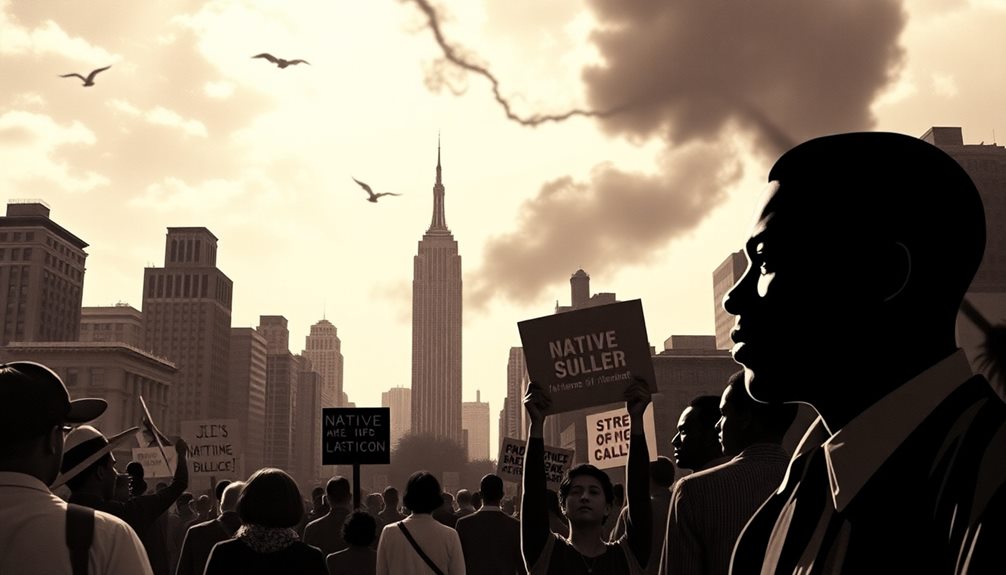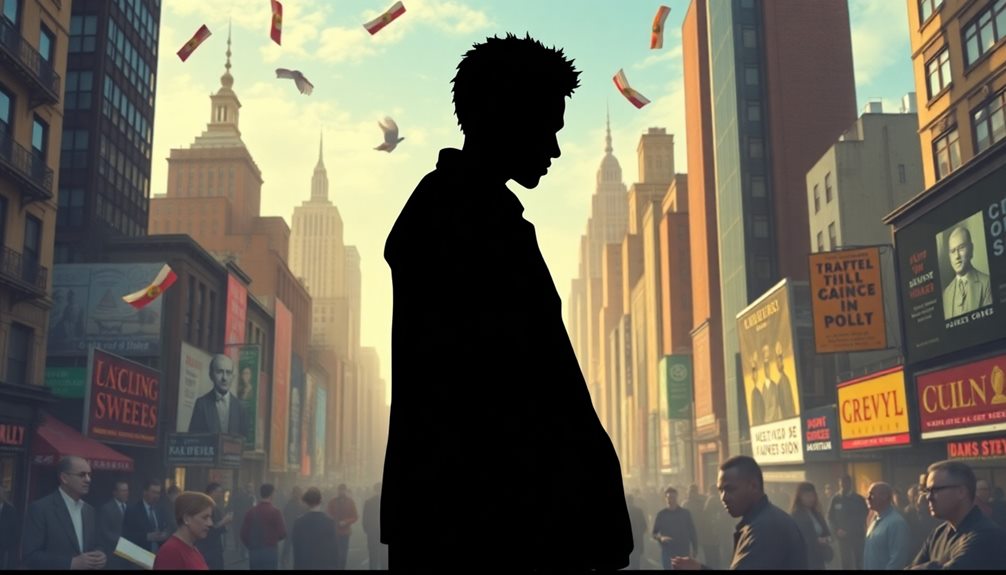*Native Son* is a powerful novel that dives into systemic racism and its impact on identity, focusing on the life of Bigger Thomas. You find that it highlights the struggles faced by marginalized individuals in 1940s America. Richard Wright's upbringing shaped his narrative, illustrating the cycle of poverty and fear. The novel sparked significant discussions about race and social justice, becoming the first best-selling book by an African American author. Its themes resonate today, urging you to reflect on ongoing issues of inequality. There's so much more about its legacy and influence that you'll discover as you explore further.
Overview of Native Son
*Native Son* serves as a powerful lens through which you can examine the harsh realities of systemic racism in 1940s America. Richard Wright's novel follows the life of Bigger Thomas, a young Black man grappling with the suffocating weight of systemic oppression in Chicago.
Divided into three parts—Fear, Flight, and Fate—the narrative explores Bigger's psychological struggles as he navigates a world that dehumanizes him. The story highlights the complex power dynamics and the pervasive impact of racism, illustrating how such societal structures perpetuate the cycle of poverty and fear among marginalized individuals.
Through Bigger's experiences, you see how fear and alienation shape his identity and decisions. The Dalton family, who embody misguided liberalism, illustrate the limitations of white empathy, highlighting how well-meaning intentions often fail to address the root causes of racial inequality.
Wright's critique of privilege and systemic racism resonates deeply, making *Native Son* a cornerstone of American literature and continuing to spark discussions about racial inequality and societal structures.
The novel's impact extends beyond its pages; it's been adapted for stage and screen, including a notable 2019 interpretation by Nambi E. Kelley. As you engage with *Native Son*, you'll find it continues to spark essential discussions about race, identity, and social justice that remain relevant today.
Richard Wright's Background
Richard Wright's upbringing in the racially charged environment of early 20th-century Mississippi profoundly influenced his literary voice and worldview. Born in 1908, he grew up in extreme poverty, facing systemic racism that left a lasting impact on his identity as a black man. This harsh reality shaped the themes he later explored in his works, including his acclaimed novel, *Native Son*.
His experiences of segregation and injustice formed the foundation of his commitment to social justice, reflecting the struggles faced by Black Americans in his narratives. In 1927, Wright moved to Chicago, where he encountered complex racial dynamics that further informed his writing. He became involved with the John Reed Club, connecting with leftist writers and activists who also focused on social justice, which served as a catalyst for his literary activism and commitment to equality.
This experience deepened his commitment to addressing racial issues through literature.
Wright's autobiographical work, *Black Boy*, offers a haunting portrayal of his childhood, detailing the trauma and challenges he faced as a black man in America. Published in 1945, it gained significant acclaim and established him as a powerful voice for the African American experience.
His literary contributions, marked by raw emotional depth and realism, laid the groundwork for future discussions around race, identity, and the struggles of marginalized communities in America.
Themes of Systemic Racism

In *Native Son*, you'll see how institutional oppression shapes Bigger Thomas's identity and actions.
This dynamic reveals the harsh realities of systemic racism, illustrating its impact not just on individuals but on entire communities.
As you explore these themes, you'll confront the consequences of racial inequality and reflect on its enduring presence in society.
Coates' exploration of systemic racism in America echoes similar themes, emphasizing the historical legacies that continue to affect Black lives today.
Institutional Oppression Dynamics
Systemic racism weaves through the fabric of American society, profoundly shaping the lives of those like Bigger Thomas in *Native Son*. Richard Wright's narrative lays bare the harsh realities of institutional oppression that trap individuals within a cycle of fear and violence.
You see how Bigger's desperate circumstances stem from a socio-economic environment that fails him, pushing him toward actions born out of sheer survival.
The novel critiques the ineffective attempts of white liberals, like the Dalton family, who think they're helping but only reinforce Bigger's sense of entrapment. Their misguided empathy further illustrates how systemic racism operates—offering a façade of support while perpetuating exploitation.
Rather than addressing the root causes of racial inequality, these well-meaning gestures often entrench the very systems of oppression they aim to dismantle.
Through Bigger's experiences, *Native Son* ignites essential conversations about the dynamics of race in America, exposing the damaging psychological effects of systemic racism on marginalized communities.
You can't help but recognize how these themes resonate today, reminding us that acknowledging institutional oppression is critical in the ongoing fight for racial justice.
Impact on Identity Formation
Frequently, *Native Son* reveals how systemic racism profoundly influences the identity of Bigger Thomas, shaping his self-perception and actions. As you immerse yourself in Bigger's world, you see how the oppressive societal structures around him mold his identity formation. He embodies the struggles faced by African Americans, grappling with the internal conflicts that arise from living in a racially charged environment.
The novel critiques white liberalism's shallow attempts to help, particularly through the Dalton family, which only highlight the failure to tackle the deeper systemic issues in Bigger's life. His violent reactions stem from feelings of powerlessness, illustrating the psychological toll systemic racism takes on his sense of self.
Bigger's flawed character serves as a lens to explore the complexities of identity formation, revealing how societal expectations and racial stereotypes shape his choices and perceptions.
Ultimately, Richard Wright's portrayal of Bigger not only reflects the despair of marginalized communities but also sparks ongoing discussions about race and identity. The legacy of *Native Son* urges you to confront the enduring effects of systemic racism that continue to shape individual and collective identities today.
Community Reflection and Consequences
Often, the community's response to Bigger Thomas's actions in *Native Son* reveals the deep-seated consequences of systemic racism. Richard Wright's portrayal of Bigger reflects the desperation and powerlessness felt by many African Americans in a society that marginalizes them.
When Bigger accidentally kills Mary Dalton, it's not just a tragic event; it's a manifestation of the internalized rage and fear fueled by systemic inequities.
The reactions of the characters around him, particularly the Daltons, showcase a superficial empathy that fails to grasp the depth of the systemic oppression at play. Their attempts to alleviate guilt only reinforce existing racial stereotypes, illustrating how well-meaning gestures can perpetuate misunderstanding.
Wright's narrative sparks essential conversations about race relations, compelling you to confront uncomfortable truths. Bigger's complexity as a character underscores the dire need for positive role models and the significant consequences of neglect within marginalized communities.
Ultimately, the community's response to Bigger serves as a mirror, reflecting the broader societal failures that shape the lives of African Americans, urging readers to recognize and address these systemic issues.
Character Analysis of Bigger Thomas
Bigger Thomas stands out as a flawed hero shaped by his harsh environment.
His character can be analyzed in light of unsung contributions in social change, reflecting how systemic oppression often breeds desperation and fear.
You can see how his actions, driven by fear and desperation, reflect the oppressive world around him.
As you explore his character, consider how his flaws and circumstances intertwine to reveal the deeper issues of systemic racism and its impact on individuals.
Flawed Hero Dynamics
In *Native Son*, the character of Bigger Thomas exemplifies the flawed hero dynamic, rooted in the complexities of his environment and internal struggles. His life is a reflection of the systemic oppression that shapes not only his actions but also his identity. You see, Bigger isn't just a product of his choices; he's a victim of the harsh realities imposed upon him.
- Bigger's fear and anger stem from deep-rooted societal injustices.
- His unlikable traits, like bullying and theft, show the absence of positive role models.
- The accidental murder of Mary Dalton reveals how fear can lead to tragic outcomes.
- His character illustrates the struggles of African Americans in a racially divided society.
- Richard Wright's work critiques social conditions while examining the psychological effects of oppression.
As you explore Bigger's journey, you confront uncomfortable truths about race and identity. He challenges you to examine not only his flaws but also the societal failures that contribute to them.
This flawed hero dynamic invites a deeper understanding of the forces that shape marginalized lives, urging you to reflect on the broader implications of systemic oppression.
Impact of Environment
Shaped by the oppressive environment of Chicago's South Side, Bigger Thomas finds himself trapped in a cycle of despair and violence. The impact of Richard Wright's portrayal of systemic racism reveals how this environment fosters hopelessness and fear, leading to Bigger's internalized feelings of powerlessness.
As you probe deeper into his character, you see how societal failures shape his actions and psyche, ultimately culminating in the accidental murder of Mary Dalton.
Bigger's distorted self-image and fear of exposure drive him further into a world of aggression and crime. Without positive role models, he resorts to bullying and theft, which only highlights how a community deprived of support can exacerbate individual flaws.
Wright illustrates that Bigger's violent outbursts aren't just personal failures; they're a reflection of the systemic oppression surrounding him.
This character analysis of Bigger Thomas underscores the profound impact of environment on one's actions. It raises critical questions about societal responsibility, urging you to reflect on how systemic racism and a lack of opportunities create cycles of violence and despair.
In Bigger's life, you witness the tragic consequences of an unforgiving environment.
Cultural and Historical Impact

While examining the cultural and historical impact of *Native Son*, it's clear that Richard Wright's groundbreaking novel not only achieved commercial success but also ignited essential conversations about race in America.
Published in 1940, it became the first best-selling book by an African American author, marking a significant milestone in American literature. The novel's portrayal of systemic racism and the experiences of African Americans resonated deeply, influencing literary and social movements in the 1940s and beyond. This aligns with the ongoing recognition of overlooked contributions from marginalized voices that enrich historical narratives.
Key elements of its impact include:
- Sparked critical discussions on systemic racism and white liberalism.
- Reflected the struggles during the Great Migration, showcasing African American experiences.
- Contributed to the artistic expression of the Black Chicago Renaissance.
- Inspired civil rights activism and ongoing debates on racial equality.
- Adapted into various forms, ensuring its relevance in cultural conversations.
Wright's characterization of Bigger Thomas continues to challenge readers, pushing them to confront uncomfortable truths about race relations in America.
The novel's legacy endures, reminding us of the ongoing journey toward understanding and justice in our society.
Critical Reception and Controversy
Often sparking intense debate, the critical reception of *Native Son* reveals a complex landscape of opinions surrounding Richard Wright's portrayal of race and identity. While some African American readers criticized the depiction of Bigger Thomas as a deeply flawed character, labeling it as a lack of positive representation, others recognized the novel's raw honesty about systemic racism and its psychological effects.
Wright's exploration of social issues through his characters set a precedent for future literary activism and resonated with ongoing struggles for equality and justice, particularly evident in his commitment to addressing these themes in works like *The Outsider* and *Black Boy* Wright's commitment to social justice.
James Baldwin saw *Native Son* as a protest novel at first but later acknowledged Wright's significant contribution to literature and discussions on race. The book's release forced society to confront uncomfortable truths, igniting vital cultural conversations about race relations.
However, despite its critical acclaim, the novel faced controversy in educational settings. Parents objected to its graphic violence and racial themes, leading to ongoing debates about its appropriateness in school curricula.
Wright's work didn't just provoke discussion; it set the groundwork for future explorations of race in literature. This controversial reception shaped the landscape for generations of African American authors and social justice movements, ensuring that *Native Son* remains a pivotal piece in the dialogue about race and identity.
Legacy and Influence on Literature

*Native Son*, published in 1940, not only became the first best-selling book by an African American author but also left an indelible mark on American literature. Richard Wright's powerful narrative challenged the Jim Crow laws and exposed the harsh realities of systemic racism, much like how other works have highlighted the contributions of marginalized individuals in history.
Its raw portrayal of black characters and their struggles sparked crucial discussions about race and identity, influencing generations of writers who followed. Stories of Survival and Resilience are essential in understanding the depth of these themes.
Here are some key aspects of the novel's legacy and influence:
- Cultural Milestone: Paved the way for future African American authors.
- Critical Discussions: Ignited debates about representation and societal failures.
- Psychological Exploration: Shaped the narrative style in social justice literature.
- Adaptations: Continued relevance through stage and film interpretations.
- Inspiration for Others: Influenced works like Bryan Stevenson's *Just Mercy*.
Contemporary Relevance and Discussions
Richard Wright's *Native Son* continues to resonate powerfully in today's discussions about race and systemic oppression. The novel's exploration of systemic oppression and racial inequality prompts you to reflect on similar issues that persist in contemporary society.
As you engage with the text, you'll find it echoes in modern social justice literature, such as Bryan Stevenson's *Just Mercy*, which critiques injustices within the American justice system. Additionally, the narrative's emphasis on hope and perseverance in the face of adversity mirrors the resilience found in historical accounts like Louis Zamperini's story in *Unbroken* the triumph of the human spirit.
Reading *Native Son* encourages critical conversations about the psychological impact of racism, revealing ongoing struggles for identity and justice among marginalized communities. Its themes aren't just historical; they mirror current social movements aiming for equality and justice.
Adaptations, like the 2019 HBO version, showcase the novel's enduring significance and its ability to connect with new audiences.
Educational institutions recognize this relevance, incorporating *Native Son* into their curricula to foster essential discussions about race, identity, and the historical context of systemic racism in America. By engaging with Wright's work, you contribute to ongoing dialogues that challenge racial inequality and advocate for a more just society.
Conclusion
In exploring "Native Son," you uncover a powerful mirror reflecting society's systemic racism and its profound effects on individuals like Bigger Thomas. Richard Wright's novel isn't just a story; it's a blazing torch that illuminates the dark corners of cultural history, urging readers to confront uncomfortable truths. Its legacy continues to spark crucial conversations today, reminding you that understanding the past is essential for shaping a more just future. Keep that torch burning brightly as you engage with these critical themes.



